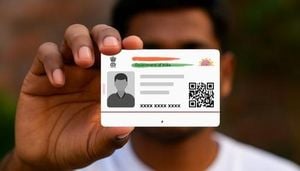Significant developments are underway across the world as countries grapple with the overlapping realms of privacy regulations and advancements in artificial intelligence (AI). From Europe’s challenges with data scraping to India’s endeavors to balance digital rights with free speech, the discussions are pivotal for shaping the future of technology and privacy.
At the heart of the dialogue is the question of whether Europe can maintain its competitive edge without sufficient training data for AI systems. This concern was highlighted during interviews conducted at the third gathering of the European AI Roundtable on December 4, 2024. Legal expert Etienne Drouard from Hogan Lovells asserted, "Scraping publicly available data for training AI models isn’t a privacy violation." His comments reflect the growing conflict between innovation-driven demands for data and stringent privacy laws like the General Data Protection Regulation (GDPR), which many argue are outdated and impede progress.
Daniel Friedlaender, Senior Vice President and Head of Office at CCIA Europe, echoed these sentiments by stating, "AI innovation depends on data diversity, and outdated privacy approaches could put Europe at a disadvantage." The discussions at the roundtable illuminated the gaps between regulatory frameworks and the realities of AI development, compelling many to question the longevity of such restrictive practices amid rapid technological growth.
Meanwhile, across the globe, Justice B R Gavai delivered keynote remarks related to privacy rights and legal governance during his visit to Kenya, directly addressing judges and advocates of the Kenyan Supreme Court. Justice Gavai articulated, "The protection of personal data in the digital age is integral to the right to privacy," which is inherently linked to the right to life. This conflation underlines the importance of protecting individual freedoms as societies become increasingly digital.
Justice Gavai also emphasized the necessary balance between free speech and the need to address misinformation, stating, "Courts are increasingly being called upon to balance freedom of speech and expression with the need to curb misinformation and online harassment." He proposed the formation of the Global South Judiciaries Association on Constitutionalism, aimed at fostering collaboration between countries like India and Kenya to tackle these pressing issues of digital governance.
Following the recent rollout of the Digital Personal Data Protection (DPDP) rules in India on January 3, 2025, major companies are also adjusting their practices. Many, including giants like Meta, American Express, and McDonald's, are hiring Data Protection Officers (DPOs) to oversee compliance with the newly imposed regulations. Akanksha Nagar reported on March 11, 2025, the growing trend among businesses to revise their privacy policies and bolster their frameworks for data protection.
Highlighting the urgency of compliance, companies have begun reaching out to consultancy and law firms for guidance. Experts, such as Jasprit Singh from Grant Thornton Bharat, noted their clients are proactively conducting audits to understand their current privacy landscapes and address gaps. Legislative expectations compel organizations across various sectors to adopt comprehensive measures to strengthen their data protection practices.
Yet, the move toward stricter data compliance is not without its criticisms. A recent study by the Advertising Standards Council of India (ASCI) pointed out alarming figures showing only 6% of Indian websites are ready to comply with the DPDP Act’s cookie processing requirements. This calls attention to the urgent need for businesses to get up to speed with new regulations.
The Internet and Mobile Association of India (IAMAI) raised concerns about the financial and technical resources required to meet compliance demands, particularly emphasizing the challenges small and medium-sized enterprises (MSMEs) face. IAMAI argued, "Compliance to the DPDP Act demands significant financial and technical resources," concluding such requirements may hinder innovation among startups.
Further complicate the situation are proposals restricting cross-border data transfer by significant data fiduciaries, which NASSCOM contends could deter investment and hinder India’s global competitiveness. Companies are now sitting at the crossroads of innovation and regulation, having to adapt quickly to the changing legal landscapes.
Globally, trends indicate scrutiny around privacy and information protection will only intensify. Legal experts foresee various jurisdictions grappling with the balance of allowing AI to thrive unhindered, even as they endeavor to protect citizens' rights. The pathways to navigate these complex issues will require collaborative efforts on both judicial and legislative fronts.
The future holds promise as nations seek to protect their citizens' rights without stifling the innovation necessary for societal advancement. Success will depend heavily on the steps taken today by both companies and regulatory bodies to maintain this delicate equilibrium between progress and protection.



